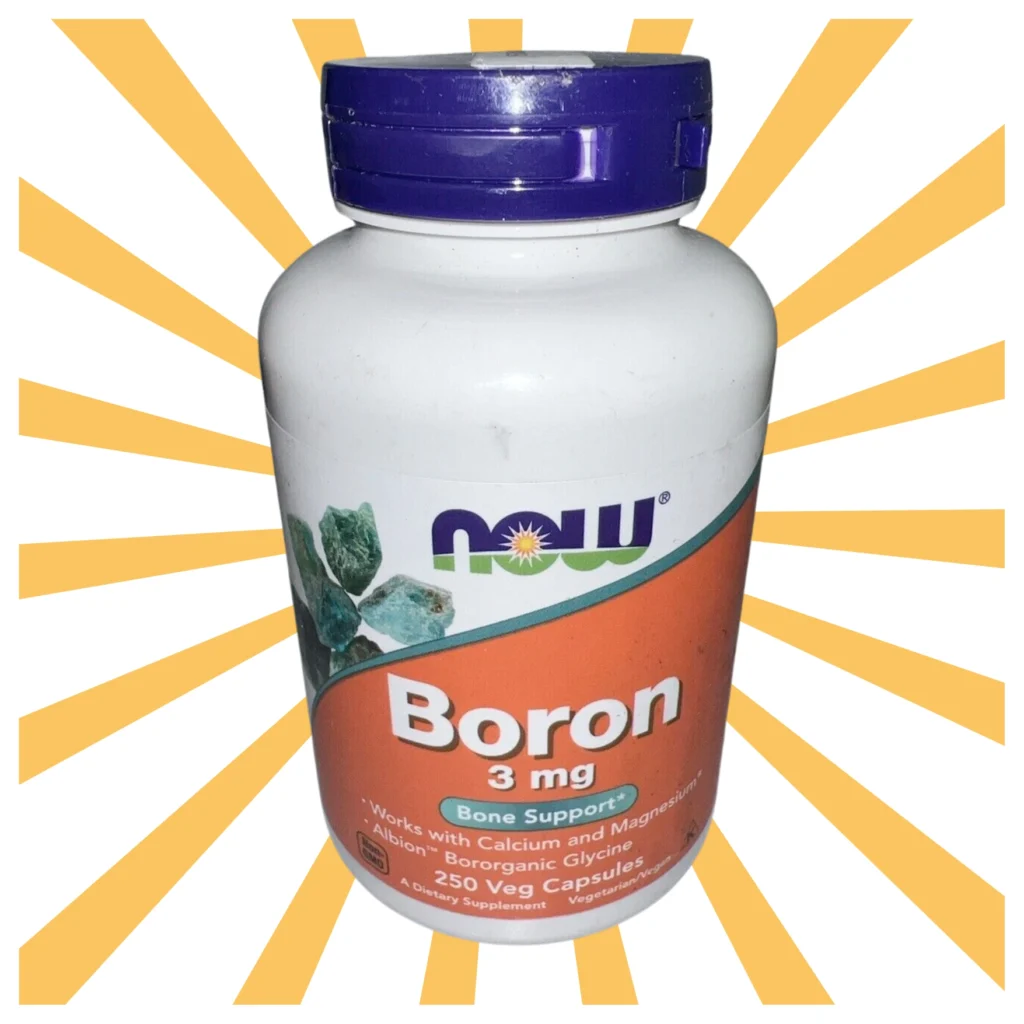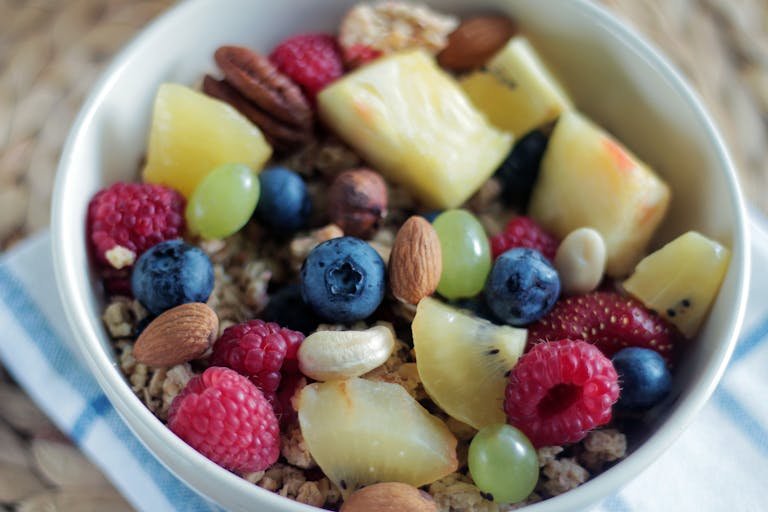Menopause, Your Gut and 4 Supplements That Will Change Your Life
Table of Contents
At least I’m hoping they will change your life or improve it significantly! They did for me – Menopause brings big changes, and your gut health might be one of them. During this time, shifts in hormones can impact digestion, energy levels, and even your mood. But thankfully improving gut health can ease many symptoms and help restore balance. Ready to support your body through this transition? Let’s go through these steps together with these easy, actionable tips to help you feel your best.
Understanding Gut Health During Menopause
As menopause begins, it’s not just about hot flashes and mood swings, your gut health can take a hit too. The balance of your microbiome and your digestion is more connected to your hormones than you might think. Let’s read on to understand why this happens and what common issues you might face.
The Role of Hormones in Gut Health
Hormones aren’t just about fertility or mood swings, they play a major role in your digestion. During menopause, declining estrogen levels can create a domino effect in your gut. Estrogen helps maintain the diversity of good bacteria in your microbiome and influences your gut’s functioning.

When estrogen dips, you might notice bloating, constipation, or even food sensitivities cropping up out of nowhere. Why? The gut’s efficiency in breaking down foods and absorbing nutrients decreases, and this imbalance can lead to inflammation. Think of your gut as a finely tuned orchestra, when one section gets out of sync (like estrogen levels), the whole performance can fall apart.
In addition to estrogen, other hormones like progesterone shift, which can slow down digestion and lead to that uncomfortable sluggish feeling. Supporting your microbiome during this time isn’t just about comfort, it’s about keeping your overall health in check.
If you’re looking for ways to naturally boost digestion and reset your gut system, check out this guide to salt water colon cleansing for safe and effective tips.
Common Gut Issues in Menopause
Many women notice digestion feels “off” during menopause. Here are some of the most common issues you might run into:
- Slower Metabolism: Feeling like your energy is stuck in neutral? With age and hormonal shifts, metabolism naturally slows, which can make digestion less efficient. This often results in bloating or weight gain, even if your diet hasn’t changed.
- Irritable Bowel Syndrome (IBS): IBS symptoms like cramping, diarrhea, or constipation can flare up or intensify due to changes in your gut bacteria. The stress associated with hormonal dips doesn’t help, either, it’s a one-two punch.
- Leaky Gut Syndrome: A disrupted gut lining can allow bacteria or toxins to “leak” into your bloodstream, causing inflammation. Menopause increases the risk due to hormonal disruptions impacting gut barrier function.
- Increased Food Sensitivities: Foods you enjoyed for years might start giving you trouble. Many women develop sensitivities to gluten, dairy, or high-fat foods during menopause.

Dealing with these issues starts by understanding your gut’s needs and taking action to support it. Remember, small steps like increasing fiber, staying hydrated, or adding probiotics can lead to big changes. You might also explore the gut health section for more ideas to help navigate this period smoothly.
Dietary Changes to Support Gut Health
When navigating menopause, you might notice changes that go beyond hot flashes and mood swings, your digestion and gut health may feel out of sync too. The foods you choose can make a significant impact on how balanced and resilient your gut feels during this time. Let’s dive into some simple yet powerful dietary adjustments that can help.
Prioritize Fiber-Rich Foods
Foods high in fiber keep things moving smoothly. A diet rich in fiber supports healthy digestion, prevents constipation, and even helps fuel the beneficial bacteria living in your gut. Foods like whole grains, fruits, and vegetables naturally deliver the fiber your body craves during menopause.
Here’s a quick list of fiber-packed foods to add to your plate:
Leafy greens like spinach and kale
Legumes such as lentils and chickpeas
Fruits like apples (leave the skin on for a fiber boost)
Whole grains such as oats and quinoa
Adding more fiber is pretty easy. You can sprinkle chia seeds into yogurt or even swap refined carbs for whole-grain options. Your gut will thank you by showing fewer bloating episodes and more regular digestion.

Incorporate Fermented Foods
Fermented foods are full of gut healthy probiotics, the good bacteria that help balance your gut microbiome. Consider adding foods like yogurt, kefir, sauerkraut, or kimchi to your meals. Don’t worry, introducing these doesn’t mean overhauling your diet completely.
Here are a few ideas to get started:
Stir a spoonful of sauerkraut into your salad or sandwich.
Replace a sugary snack with a small bowl of plain yogurt topped with fresh fruit.
Sip on a glass of kefir as a refreshing alternative to milk.
Probiotics are great for easing bloating and improving digestion. If you’ve felt like your gut health menopause symptoms are stealing your comfort, fermented foods might just be the fix you’ve been searching for. Want even more guidance on fueling a healthy body? Explore additional tips in the gut health section.
Avoid Gut Irritants
While some foods nourish and support your gut, others can secretly create havoc. Processed sugars, caffeine, and alcohol are common culprits that irritate the gut lining and promote inflammation. Think of them as the uninvited party guests, they show up, disrupt the vibe, and leave a mess behind.
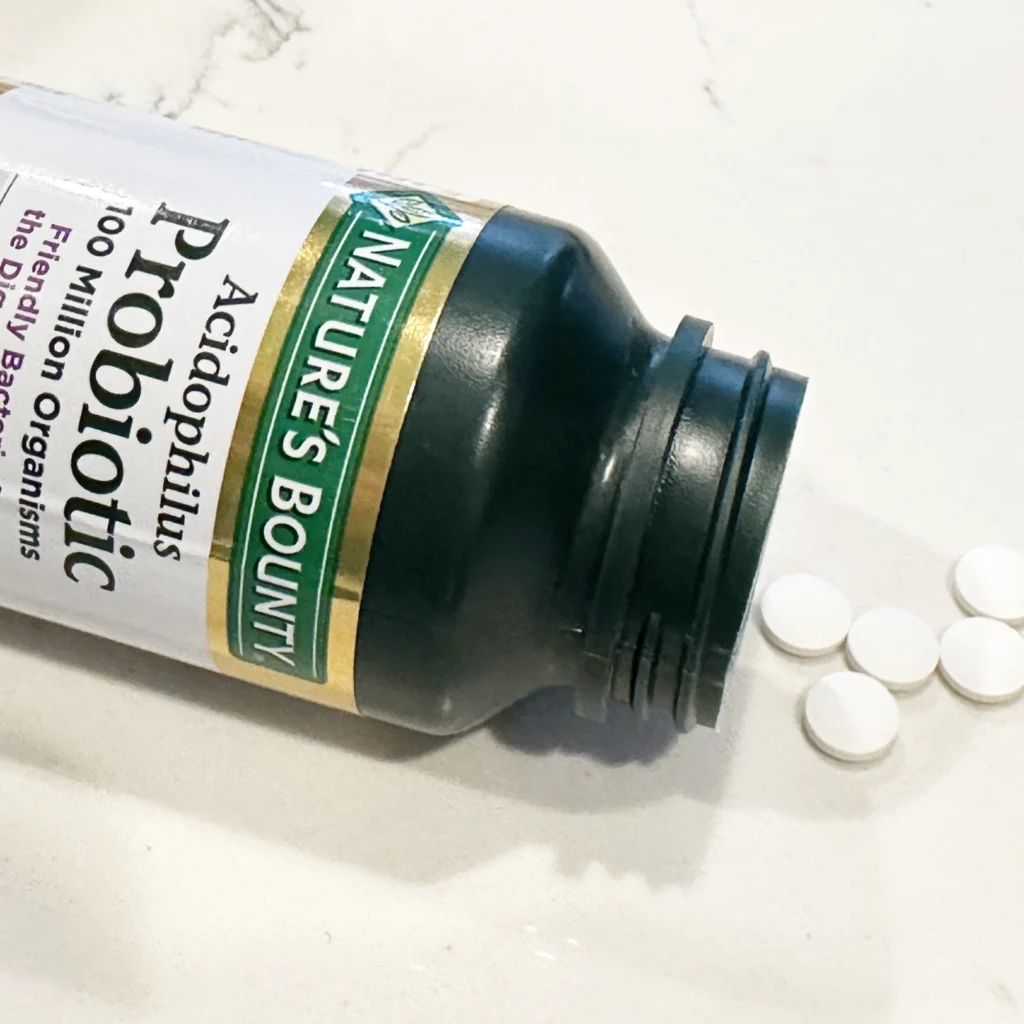
Here’s how you can combat these irritants:
Limit processed sugary snacks by swapping them for naturally sweet options, like a handful of berries.
Reduce caffeine gradually if you rely heavily on coffee; try herbal teas or decaf versions instead.
Cut back on alcohol by experimenting with mocktails or sparkling water infused with fruit.
Making these changes isn’t about depriving yourself; it’s about giving your gut the chance to heal and function optimally. A healthier gut means better energy and mood which makes managing menopause a little more manageable.
With these small tweaks, you’ll be taking a powerful step toward improving your digestion and overall well-being.
Digestive Enzyme Supplements for Gas and Bloating
When menopause triggers changes in your digestion, digestive enzyme supplements can provide much-needed support. These enzymes act as a behind-the-scenes team, ensuring the food you eat is properly broken down, so your body absorbs the nutrients it needs. Let’s explore how they work and the best tips for choosing one that suits your needs.
How Digestive Enzymes Work
Digestive enzymes help break down proteins, carbs, and fats into smaller molecules your body can absorb. As we age or eat poorly, enzyme production often decreases. Without enough enzymes, you may experience bloating, stomach discomfort, or struggle to absorb nutrients properly.
Proteins into Amino Acids: Enzymes like proteases handle breaking down protein-rich foods like chicken or beans into amino acids that repair and build tissue.
Carbohydrates into Sugars: Amylase takes carbs and simplifies them into sugars for quick energy.
Fats into Fatty Acids: Lipase digests fats, which help with energy storage and cell production.
As hormone levels, particularly estrogen, decline during menopause, the body’s digestive efficiency can reduce—leaving your gut struggling to manage the workload. Digestive enzymes (like this one that I take!) step in to help your body better absorb nutrients and reduce gas, bloating and indigestion. This one little supplement has been a GAME CHANGER for me. I’ve noticed that I don’t have to take them all the time. I started for about 6 months and then was able to cut back. But whenever I notice issues coming back I start taking them again.
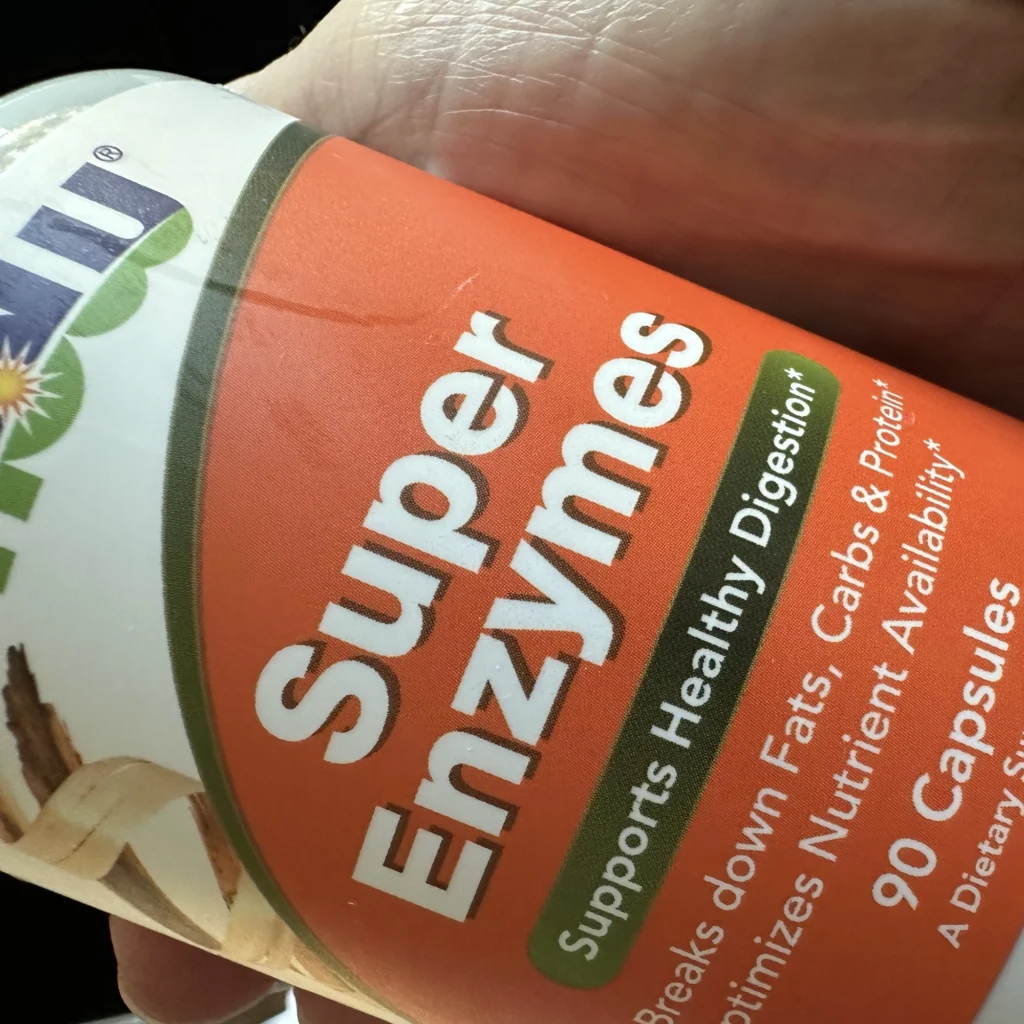
Choosing the Right Supplement
Not all digestive enzyme supplements are created equal, so how do you know which one to pick? Here’s a checklist to guide you:
- Ingredients Match Your Needs: Check the label for key enzymes. If fatty foods are your struggle, prioritize lipase. For carb-heavy meals, seek out amylase.
- Plant-Based vs. Animal-Based: Plant-based enzymes tend to work in a broader pH range, aiding digestion under various conditions.
- Combination Blends: Look for supplements that combine multiple enzymes for all-around support.
- Free of Unnecessary Additives: Choose products without added sugars, artificial flavors, or fillers.
Digestive enzymes. <<– this one is my favorite.
When should you take them? Pop one right before or during meals to give your gut the helping hand it needs when it’s most active. Starting small and observing how your body reacts is always a good approach, especially if you’re trying them for the first time. And don’t forget – consistency matters.
For more tips on staying proactive with your gut health, check out the gut health section, packed with resources tailored to your menopause journey.
A better gut doesn’t have to be hard to achieve. Digestive enzymes can be just the support your body needs to make a huge difference. I’ve recommended them to so many friends over the years!
Magnesium Glycinate for Sleep, Digestion and Hormones
When it comes to managing gut health during menopause, magnesium glycinate is essential. This particular form of magnesium supports both your digestive system and hormonal balance, making it a double-duty supplement during menopause. Let’s take a look at why it works so well and how to use it safely.
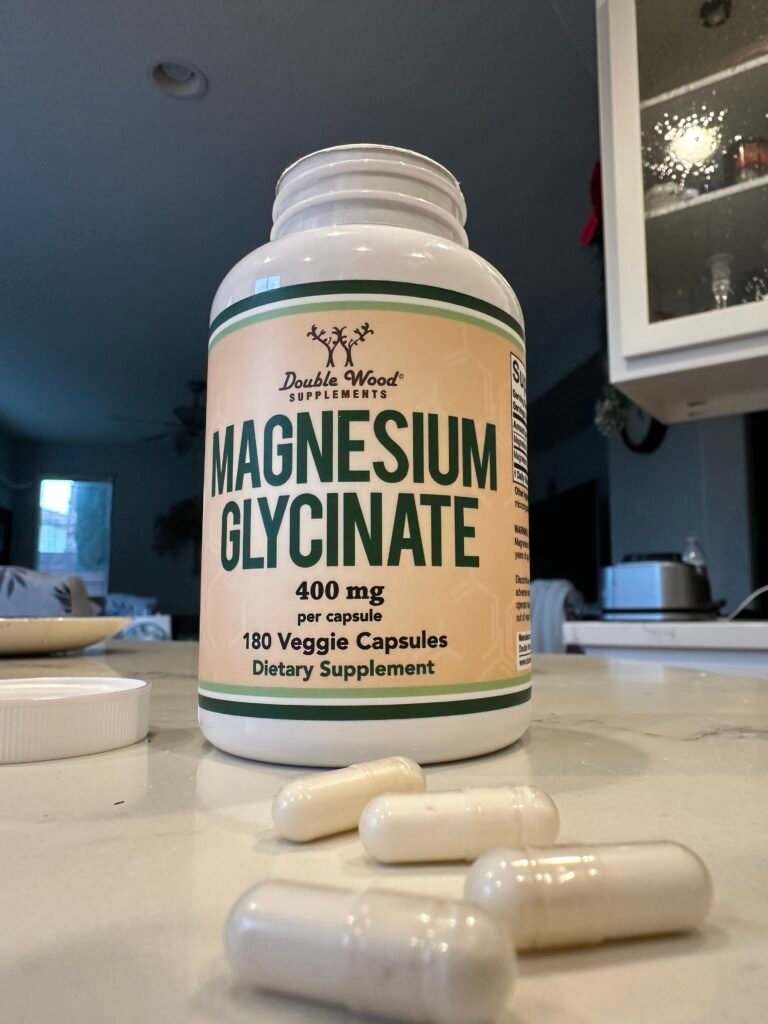
Why Magnesium Glycinate?
Not all magnesium supplements are created equal. Some can upset your stomach, while others may not absorb effectively. Magnesium glycinate, on the other hand, is a gentle yet powerful form that’s easy for your body to absorb. Here’s why it works so well:
Superior Absorption: Compared to other types like magnesium oxide, glycinate bonds with an amino acid (glycine), allowing it to be absorbed more effectively without causing digestive upset.
Promotes Relaxation: Glycine itself has calming properties, which help ease stress-related digestive issues like bloating or cramping. This can be especially helpful when dealing with hormone-induced gut problems. Take it about an hour or two before bedtime.
Combats Constipation Without Overstimulation: Some magnesium types act like laxatives, which can throw your system off balance. Magnesium glycinate offers a milder solution for staying regular without the rush-to-the-bathroom feeling.
Balances Hormones: Magnesium is key to processes like regulating cortisol (stress hormone) and supporting estrogen metabolism, both of which are crucial during menopause.
In essence, magnesium glycinate doesn’t just boost your gut – it also smooths out the hormonal rollercoaster.
Boron for Bone Health and So Much More
Boron might not be a mineral that gets much attention, but it’s a powerhouse for menopausal health. It plays a crucial role in both gut health and maintaining strong bones during this life stage. If you’ve been struggling with digestion or noticing changes in bone density, understanding how boron works can be a game-changer in managing menopause more effectively.

How Boron Supports Gut Health & Menopause Symptoms
Boron’s effect on gut health is deeply tied to its ability to reduce inflammation and improve nutrient absorption. During menopause, gut issues often take center stage, and inflammation becomes a common culprit of discomfort. Boron steps in as a natural anti-inflammatory, helping calm your gut and reduce those flare-ups that disrupt digestion. Let’s take a look at more benefits of boron below.
1. Bone Health Support:
- Boron helps the body metabolize calcium, magnesium, and vitamin D, which are essential for maintaining bone strength.
- This can be beneficial during menopause, as the decline in estrogen increases the risk of osteoporosis.
2. Hormone Balance:
- Boron has been linked to the regulation of sex hormones, such as estrogen and testosterone.
- It may enhance estrogen levels, which could help reduce symptoms like hot flashes, night sweats, and mood swings.
3. Anti-inflammatory Properties:
- Boron contributes to reducing inflammation in the body, potentially relieving joint pain or stiffness that some women experience during menopause.
4. Cognitive and Mood Support:
- It may aid in cognitive function and reduce mental fog, a common complaint during menopause.
5. Magnesium Optimization:
Boron assists in retaining magnesium levels in the body, which contributes to better sleep and muscle relaxation, often disrupted during menopause.
Best Sources of Boron
You don’t need specialty foods or complex routines to tap into boron’s benefits. It’s readily available in many everyday foods, and there are also supplements if you’re looking for a more concentrated option. Let’s break this down so it’s easy to incorporate into your diet.
Dietary Sources
Here are some boron-rich foods to boost your intake naturally:
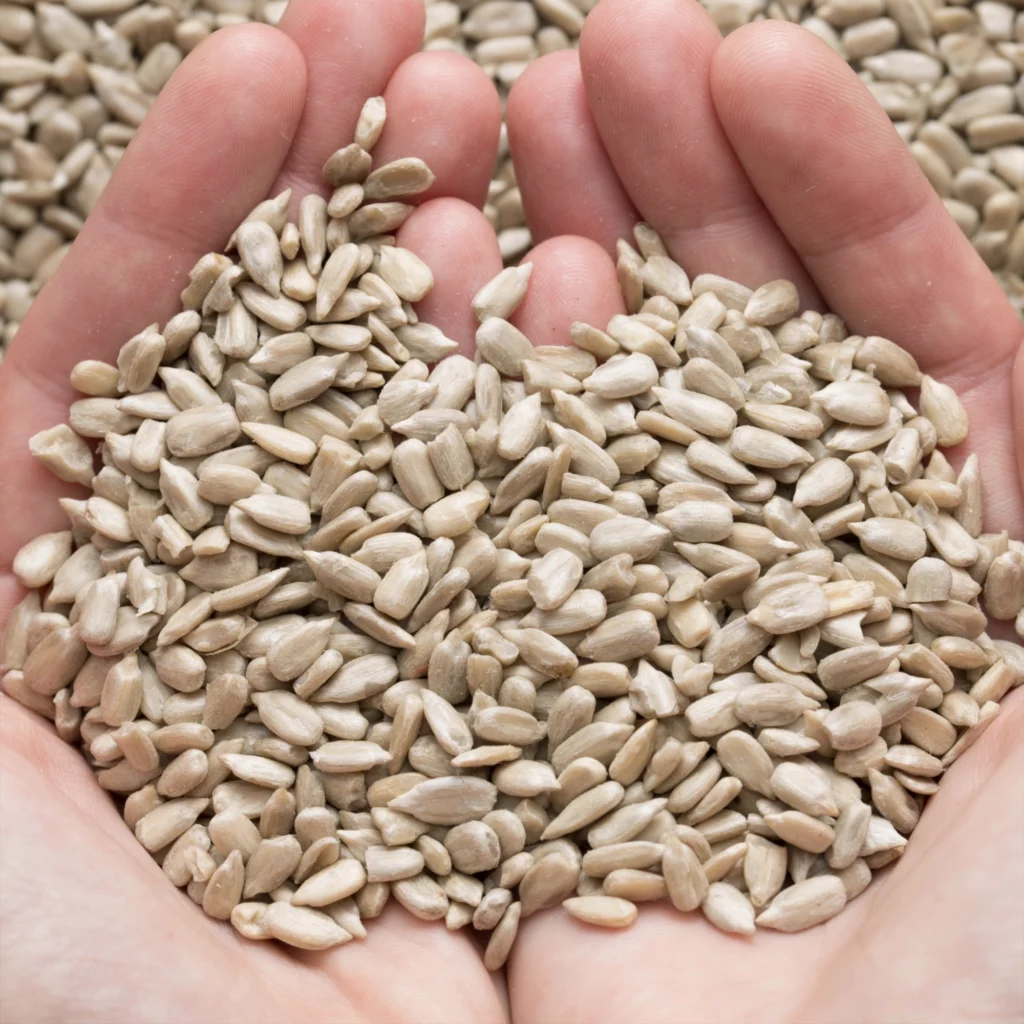
- Nuts and Seeds: Almonds, walnuts, and sunflower seeds are easy-to-add snack options.
- Fruits: Apples, bananas, and raisins are not only sweet treats but packed with boron.
- Vegetables: Broccoli, carrots, and avocados are superstars when it comes to boron content.
- Legumes: Beans, chickpeas, and lentils are great for fiber and boron, it’s a win-win.
Supplements
If hitting those daily boron targets through food feels challenging, a supplement may be your best bet. Look for options that specify bioavailability, this ensures your body can absorb boron effectively. Always pair supplements with meals for optimal absorption.
Easy Tips for Incorporation
- Sprinkle nuts or seeds on your salads or morning oatmeal for a boron boost.
- Swap out chips for boron-rich veggie sticks like celery and carrots.
- Add a handful of raisins or dried fruits to your yogurt or cereal.
- When buying supplements, consult with your healthcare provider to ensure the dosage fits your specific needs.
This is the Boron supplement I take.
Giving boron a seat at the table doesn’t have to be complicated. Small adjustments can deliver big results, especially when combined with other gut-friendly habits. Stay consistent, and you’ll notice the difference, especially as your digestion and energy levels improve.
Iodine for Thyroid and Menopausal Symptoms
Maintaining your thyroid and gut health during menopause can feel like juggling two acts at once. But there’s a key nutrient that plays a vital role in keeping both systems in harmony – Iodine. It’s a trace mineral often associated with thyroid function, but its impact extends to your digestive system too. Let’s explore how iodine ties these two powerhouse systems together and practical ways to include it in your routine.
The Thyroid-Gut Connection
Your thyroid is like the body’s command center for metabolism, producing hormones that regulate everything from your energy levels to how efficiently your digestive organs function. When your thyroid isn’t performing at its peak – often due to low iodine – your metabolism can slow down, throwing off your gut health in the process.
Thyroid hormones directly influence the quality and movement of digestion. Fewer hormones can mean slower intestinal motility, leading to constipation or bloating, common struggles during menopause. Additionally, a sluggish thyroid can alter gut bacteria balance, a key player in nutrient absorption and immune defense. It’s easy to see how the thyroid and gut are closely intertwined.
So, how does iodine help? Iodine is essential for producing thyroid hormones like thyroxine (T4) and triiodothyronine (T3), which set the rhythm for your metabolism. Supporting your thyroid with adequate iodine can not only boost metabolism but also help improve gut motility and microbiome diversity, a win-win for managing gut health during menopause.
Safe Ways to Increase Iodine Intake
Now that we know the benefits, the next step is finding safe, effective ways to get more iodine in your diet.
Iodine-Rich Foods
You can incorporate iodine easily through natural food sources:
- Seaweed: Nori, wakame, and kelp are some of the richest sources of iodine. Even a small serving packs a punch.
- Dairy: Milk, yogurt, and cheese often have iodine, thanks to iodine-rich animal feed.
- Eggs: Specifically, the yolk is a good source.
- Fish and Shellfish: Cod, shrimp, and tuna not only provide protein but also iodine.

Supplementation with a Natural Source of Iodine
If your diet falls short, iodine supplements might be an option. However, too much iodine can disrupt thyroid function, so it’s critical to proceed with caution.
- Low-Dose Supplements: Start with a low-dose iodine supplement and monitor how it impacts you over time. My Favorite Natural Supplement: Kelp.
- Combination Supplements: Look for multivitamins that include iodine to avoid excessive dosages.
- Consult Your Doctor: Always talk to a healthcare provider before introducing supplements, especially if you suspect thyroid issues.
Simple At Home Test for Iodine Deficiency
The iodine patch test is a quick way to estimate iodine levels but isn’t scientifically accurate.
Steps:
- Get 2% iodine solution from a pharmacy.
- Apply a 3×3-inch patch to your forearm, abdomen, or thigh.
- Watch the patch over 12–24 hours. If it fades within 6–12 hours, it might suggest low iodine.
Limitations:
- Not reliable; sweat, skin type, and other factors can affect results.
- For accurate testing, see a doctor for urine or blood tests.
If you have symptoms like fatigue, hair loss, or dry skin, consult a healthcare provider.
Iodine deficiency during menopause can intensify common symptoms like fatigue and digestive discomfort. By incorporating iodine-rich foods and following a mindful approach to supplementation, you’re giving both your thyroid and gut the boost they need. Remember that balancing this nutrient goes a long way in improving your gut health and overall well-being.

Lifestyle Changes to Enhance Gut Health
Supporting gut health during menopause doesn’t need to be overwhelming. Simple lifestyle shifts can create a ripple effect, improving digestion, reducing bloating, and enhancing energy levels. These changes aren’t just about what you eat, they include how you live. Incorporating these lifestyle habits into your daily routine might be the missing piece your gut needs.
Practice Mindful Eating
Think about how often meals turn into rushed moments while multitasking. Mindless eating is a common habit, but it can wreak havoc on your digestion. When you eat too quickly or in a stressed state, your body doesn’t have the chance to properly digest and absorb nutrients. It’s like expecting your car to run well without giving it regular maintenance.
Here are a few simple strategies to practice mindful eating:
- Chew Thoroughly: Break down each bite into smaller pieces before swallowing. This reduces the workload on your digestive system and enhances nutrient absorption.
- Eat Slowly: Take your time, putting your fork down between bites. Slow eating allows your brain to catch up with your body, helping you recognize when you’re full.
- Minimize Distractions: Focus on your meal rather than a screen. This allows you to enjoy your food and listen to your body’s hunger cues.
Prioritize Stress Management
Stress and gut health are more connected than you might think. When you’re stressed, your body enters fight-or-flight mode, which diverts energy away from digestion. This can result in symptoms like bloating, cramping, or irregular bowel movements. Finding ways to reduce stress isn’t just good for your overall wellness – it’s essential for your gut.
A few effective ways to start managing stress include:
- Yoga or Gentle Stretching: These help calm the mind and stretch out tension in your body.
- Meditation: Even just a few minutes of deep breathing or mindfulness can center your thoughts. Learn more about how to meditate in this article.
- Journaling: Writing down your thoughts or simple affirmations can clear mental clutter.
Making room for stress management in your life is a necessity, not a luxury, especially during menopause. You’re nurturing not just your mind but also your gut. Small steps can lead to big changes.
Maintain Physical Activity
You might already know that regular exercise offers numerous health benefits, but did you know it’s also excellent for your gut-health Physical activity stimulates the small muscles in your intestines, keeping everything moving smoothly. Regular movement helps regulate bowel movements, reduces bloating, and eliminates waste effectively.
Not sure how to get started? Here are some ideas:
Walking: A 20–30 minute walk daily can improve gut motility and reduce stress.
Yoga or Pilates: Both are excellent for strengthening core muscles that support digestion.
Aerobic Activities: Dancing, swimming, or even gardening can target digestion while being fun.
Looking for more ways to stay active without dedicating hours to a routine? Read 10 Ways to Get 10,000 Steps a Day Without Even Trying for easy ways to move that you can fit into your everyday life.
Consistency is key. By staying active, you’re not just helping your gut, you’re laying the groundwork for better hormonal balance, mood, and energy. It’s all connected, and your gut will thank you for it!
Taking care of your gut health during menopause is one of the smartest investments you can make for your overall well-being. Each small step—whether it’s embracing fiber-rich foods, staying hydrated, or incorporating digestive enzymes—adds up to create a stronger, healthier you.
Lifestyle habits like mindful eating, managing stress, and regular movement amplify these dietary and supplement strategies. Remember, your gut isn’t just about digestion; it’s key to energy, mood, and even hormonal balance.
Don’t wait for discomfort to hold you back. Start today with one actionable change, like trying a digestive enzyme supplement here. Take charge of your health, and watch how balanced digestion can positively impact your life through menopause and beyond.
Read The Complete Guide to Hormone Replacement Therapy Here


